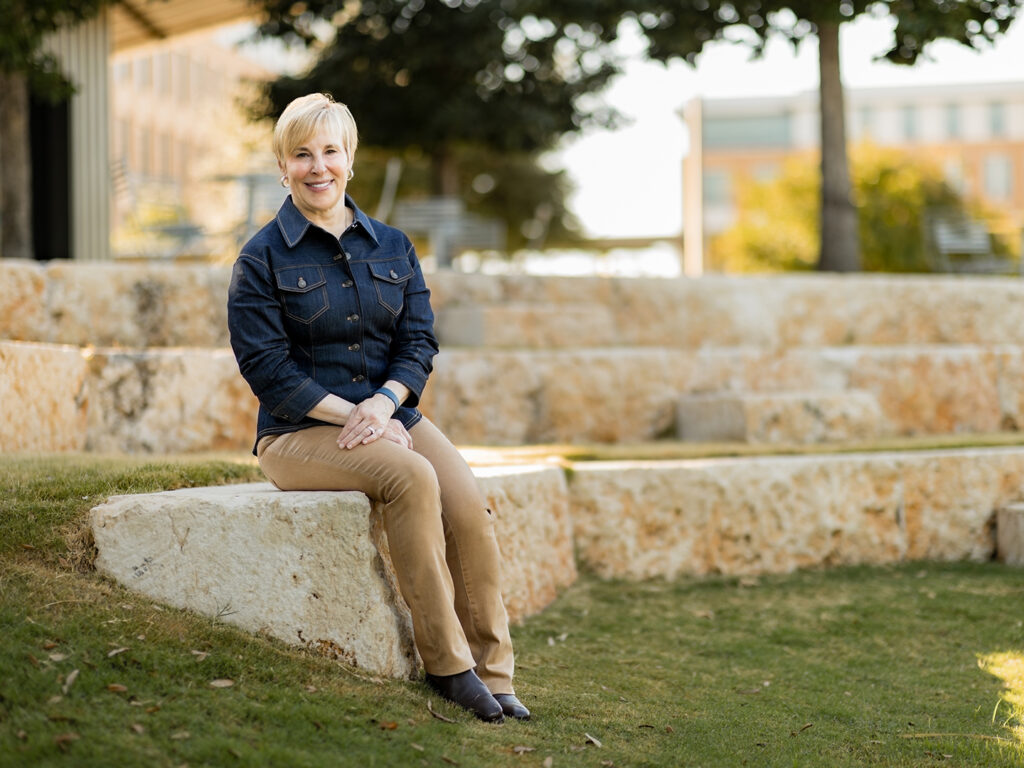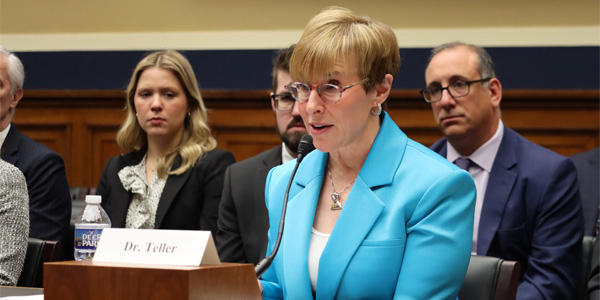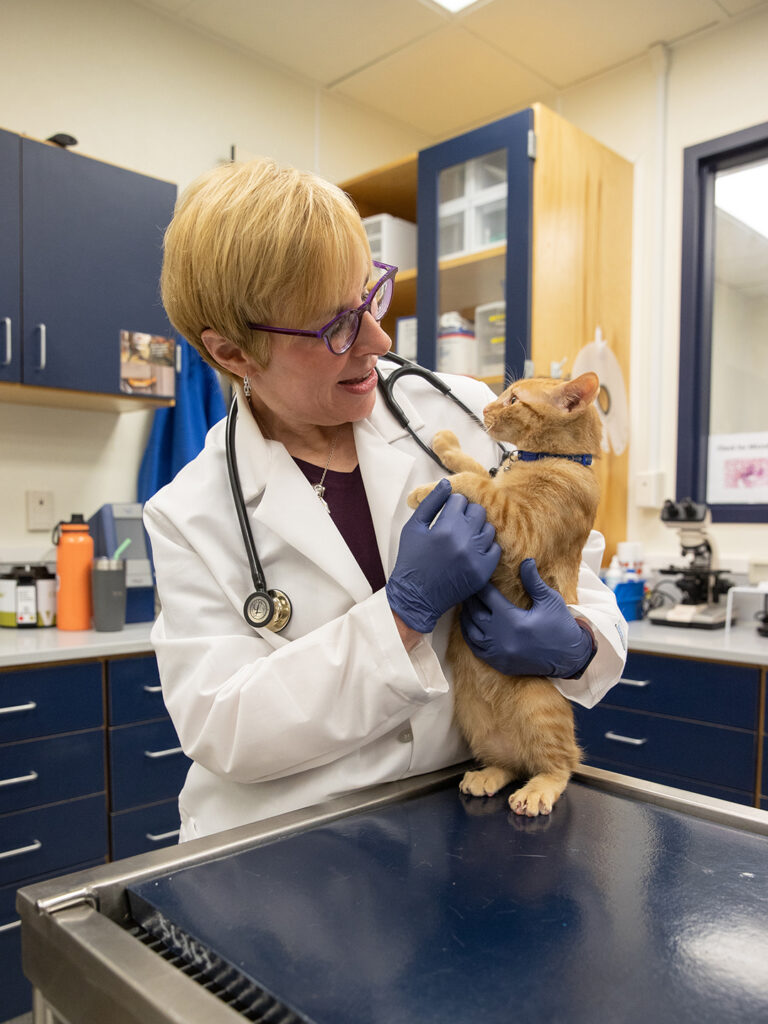Teller Reflects On AVMA Presidency, Its Impact On Her Future At Texas A&M
Story by Megan Bennett, VMBS Communications

Photo by Jason Nitsch ’14, Texas A&M School of Veterinary Medicine & Biomedical Sciences
Dr. Lori Teller is not one to be idle.
The clinical professor at the Texas A&M School of Veterinary Medicine & Biomedical Sciences (VMBS) already has a busy workload leading the school’s Virtual Vet telemedicine program, treating patients in the Small Animal Teaching Hospital’s Primary Care Service, and teaching Doctor of Veterinary Medicine students at all levels.
On top of that, Teller regularly takes on new leadership opportunities outside of Texas A&M University, including with organized industry groups like the Texas Veterinary Medical Association and the American Board of Veterinary Practitioners. Most recently, she completed a one-year term as president of the American Veterinary Medical Association (AVMA), the nation’s leading advocate for the veterinary profession.
In this position, Teller was responsible for representing more than 100,000 veterinary professionals through activities like congressional testimonies, media interviews, international meetings, and more.
As Teller reflects on her year as president of the AVMA, she also looks forward to using those experiences to enhance her role at Texas A&M.
Q&A: An Interview With Dr. Lori Teller, Immediate Past President Of The AVMA
Q: What led you to pursue this position?
A: My main impetus to run was the possibility to impact more than 100,000 veterinarians, plus thousands and thousands of other veterinary team members. A lot of that goes with policymaking and being able to advocate on their behalf, whether that was at state legislatures, Congress, regulatory agencies, or even with the general public and the media. It was an opportunity to really help others understand what veterinarians do.
Q: What were some of your biggest accomplishments during your time as president?
A: It was essentially a full-time job on top of my full-time job, but it was great because of the variety of things I got to do, the people I got to meet, and the places I got to go across the country and around the world.
I spent a lot of time studying and taking a deeper dive on a variety of issues before meeting with the appropriate audience members, whether that was legislators, regulators, or the media.
I also met with veterinary technicians and hospital managers who support veterinarians, industry groups, and sometimes even pre-veterinary and veterinary students. I enjoyed talking to them about what it means to be a veterinarian and what a rewarding career path it can be.
There were several international trips associated with my presidency, and it’s amazing, the similarities that we have with our colleagues in Europe and Asia and Australia. It was also important to see some of the differences in lower-resourced countries and the challenges they face so that we could determine what the AVMA and the international veterinary community can do to support them.
It was a once-in-a-lifetime opportunity to really make a difference and elevate the veterinary profession, both here in the U.S. and around the world.
Q: What are some of your favorite memories from the past year?

A: We all know veterinarians are amazing, even under stress, and that we have to pivot a lot when something comes up. Last November, I was in a fascinating meeting in Malta about some of the similarities and differences between how veterinarians can practice in the European Union versus in the U.S. A speaker finished his talk and stepped off the podium, and then when somebody asked a question and he turned around to answer, he collapsed from a massive heart attack. The veterinarians around him raced over and immediately started doing CPR while somebody ran to get the AED device and someone else called the emergency response number. They had to do CPR on him for 26 minutes and shock him six or seven times with the AED before the paramedics arrived. As he was being wheeled out on the gurney, he looked at the crowd and put his thumb up to say, “Everything is OK.” It was amazing. If you have to have a heart attack and can’t be in an ER surrounded by cardiologists, then your next best choice is to be surrounded by a group of veterinarians who will immediately act to ensure that their colleague is going to survive.
I also went to the U.S. Veterinary Military Corps program in Garmisch, Germany, in May, spending several days with U.S. veterinarians and our NATO ally veterinarians and technicians. It was fascinating to learn what that very small group does — there are only about 500 veterinarians in the military around the world — and the vast responsibility they have. The veterinarians in the U.S. are responsible for ensuring a safe and secure food supply for the military. Think about the hundreds of thousands of people we have in the military and only a few hundred are responsible for ensuring the entire food supply. Different segments of military veterinarians are also responsible for the health of military working animals — dogs, horses, and even the dolphins in the Navy — and any pets that our military personnel may have. They are an amazing group of people.
Testifying before Congress in March to advocate for veterinarians’ continued ability to have access to both name- brand drugs and generic drugs was a big highlight as well.
Finally, putting together the AVMA’s holiday video (providing an annual health checkup for Santa’s reindeer) was a lot of fun. Those juvenile reindeer were hilarious; they’re like Labrador Retriever puppies. They wear harnesses like gentle leaders and one reindeer was not happy about it, so he came over and kept rubbing his face on my leg to try to get it off, but he kept bopping me in the face with his antler. It was pretty funny. I also learned that while raisins are toxic to dogs, they’re a major treat for training reindeer. I think we went through an entire tub of raisins doing the video.
Q: Do you have plans for pursuing future leadership positions?

A: I was just elected to the Board of Directors for the American Board of Veterinary Practitioners and I also serve as their Canine/Feline Regent, so I’m the liaison between the board and the general diplomats who are boarded canine/feline.
For the AVMA, the immediate past-president automatically becomes the chair of the American Veterinary Medical Foundation, so I’ll be doing that for the next year as well.
Q: How will your time as president impact your work at Texas A&M?
A: The biggest thing is that I have learned and grown even more as a leader and a mentor, and I have a better understanding of the impact and importance of those roles. That will help guide my interactions with students and junior faculty members.
I’ll also have new experiences to share in some of the classes I teach. For example, I discuss the important role of organized veterinary medicine in the first-year class “Veterinarians in Society.” I also have a class about advocacy and hot topics in the veterinary profession, as well as a panel about the different organizations in veterinary medicine and how they can support someone’s veterinary career.
There were also lots of connections I made that can help the university and the veterinary school to expand the ways we can teach our students and attract new faculty and staff to the school. If there’s anything that I can do to help support that, I will.
At the end of her tenure, Teller had the opportunity to recognize three institutions that have been most instrumental in her professional development with the AVMA President’s Award. She presented one of these awards to the VMBS during the 2023 AVMA Convention on July 14.
“It is no easy task to teach students everything they need to know to be ready for practice after graduation,” Teller said while presenting the award to Dr. John R. August, the Carl B. King Dean of Veterinary Medicine at Texas A&M. “The compassion, intelligence, patience, and grace of the faculty and staff at the Texas A&M University School of Veterinary Medicine & Biomedical Sciences continue to inspire me, and much of what they do is unrecognized and under-appreciated by the veterinary profession. Their support of my endeavors is most definitely appreciated. Because of the work that they do, the future of veterinary medicine is indeed very bright.”
###
Note: This story originally appeared in the Fall 2023 issue of VMBS Today.
For more information about the Texas A&M School of Veterinary Medicine & Biomedical Sciences, please visit our website at vetmed.tamu.edu or join us on Facebook, Instagram, and Twitter.
Contact Information: Jennifer Gauntt, Director of VMBS Communications, Texas A&M School of Veterinary Medicine & Biomedical Sciences; jgauntt@cvm.tamu.edu; 979-862-4216


